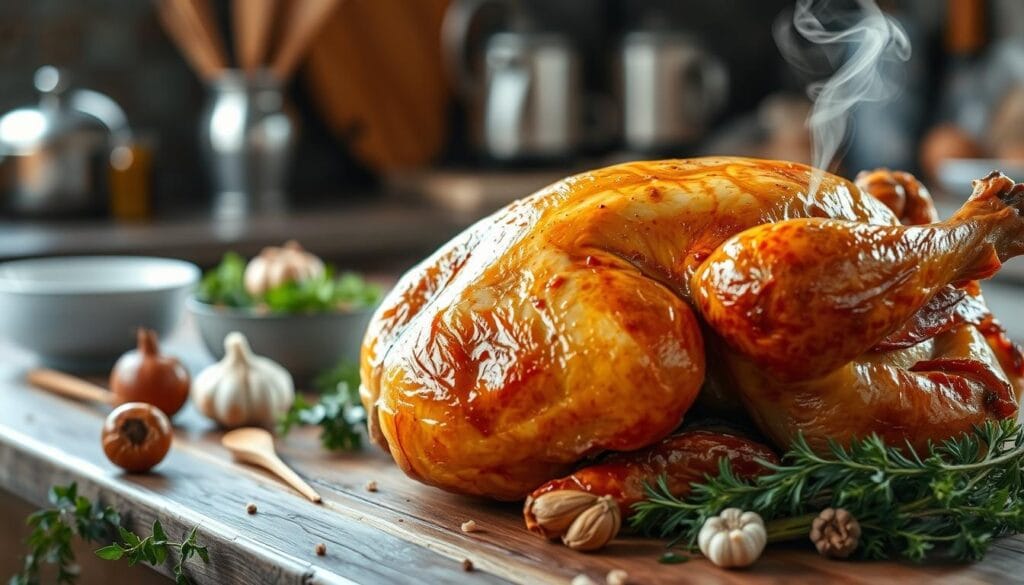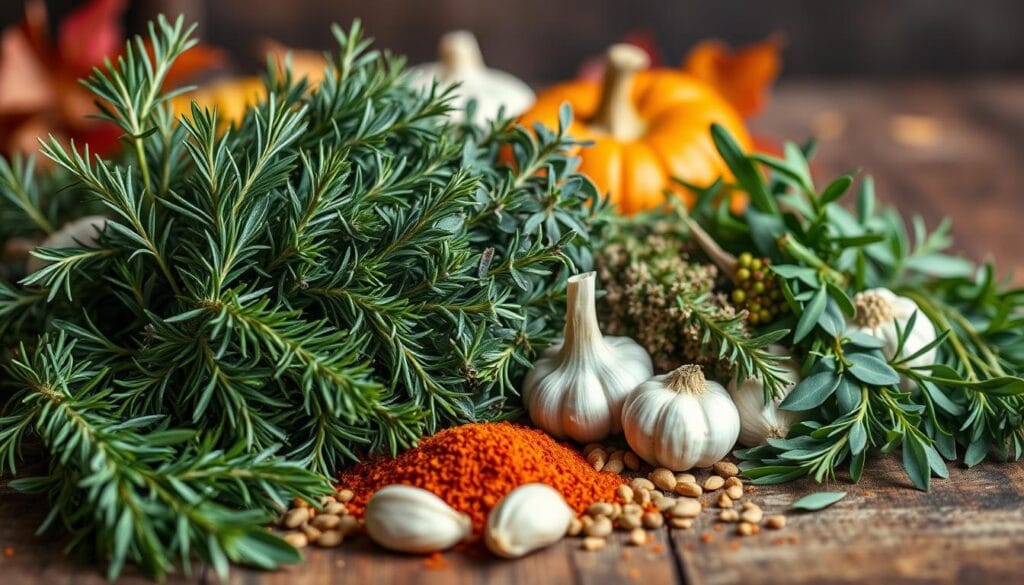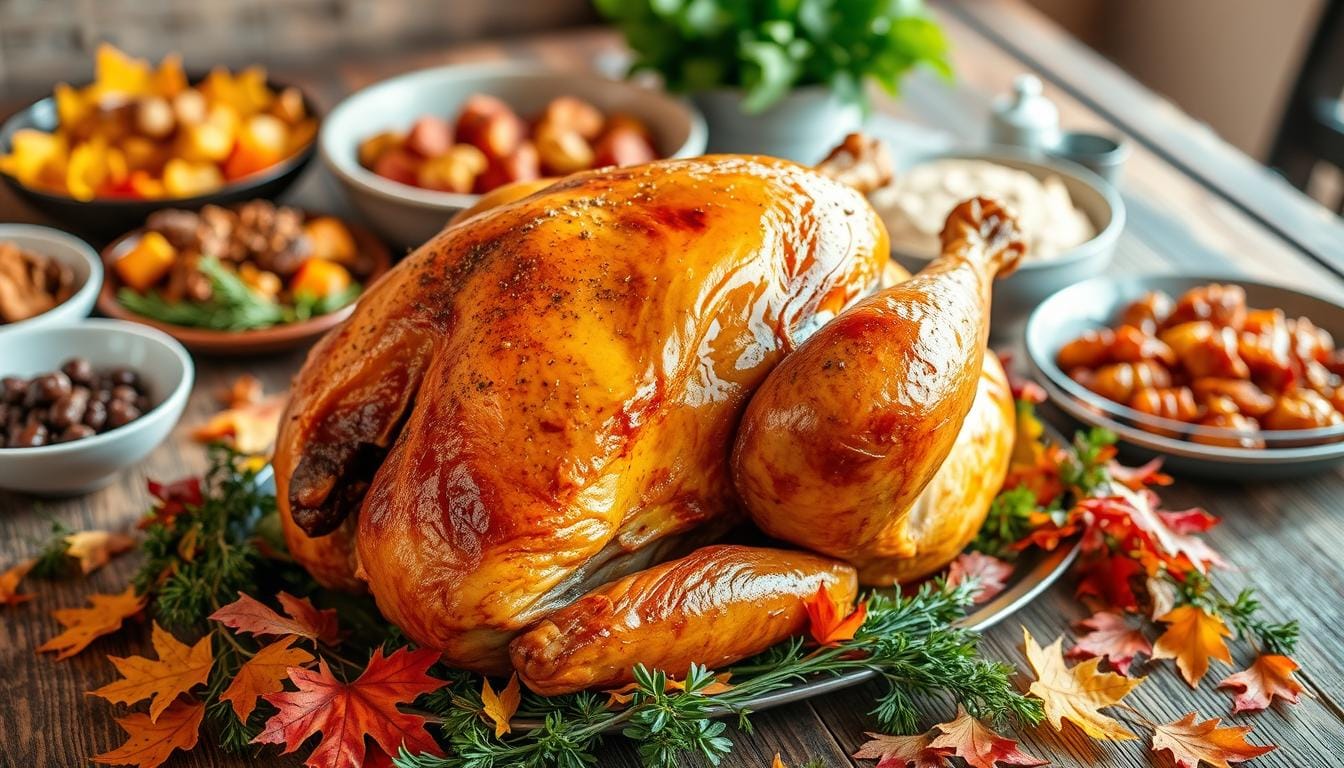Thanksgiving and Christmas are all about the turkey recipe . Making the best turkey recipe is an art. It needs skill, knowledge, and secrets to make it unforgettable.
It’s not just about following a recipe. It’s about technique, timing, and preparation. Whether you’re new to cooking or experienced, the right turkey recipe can make your holiday meal special.
Professional chefs say a great turkey recipe needs detail. From picking the right turkey to knowing the cooking temperature, every step is crucial. This makes your turkey juicy and flavorful, impressing your guests.
Key Takeaways
- Choose the right turkey size for your gathering
- Understand proper thawing techniques
- Master temperature control during cooking
- Use high-quality herbs and seasoning
- Allow sufficient resting time after cooking
- Invest in reliable kitchen tools
Essential Pre-Cooking Preparation Steps
Starting a delicious homemade turkey recipe begins before you turn on the oven. The right steps can turn an easy turkey recipe into a memorable meal. Let’s explore the key steps for a successful dish.
Proper Thawing Methods
Thawing your turkey safely is key for taste and safety. The USDA says to thaw in the fridge for 24 hours for every 4-5 pounds. For a 15-pound turkey, plan 3-5 days ahead.
- Refrigerator thawing: Slowest but safest method
- Cold water thawing: Faster alternative
- Never thaw turkey at room temperature
Essential Equipment and Tools
Your easy turkey recipe needs specific tools for perfect results. Here’s what you’ll need:
| Tool | Purpose |
|---|---|
| Roasting Pan | Even heat distribution |
| Instant-Read Thermometer | Check internal temperature |
| Large Cutting Board | Prepare and carve turkey |
| Kitchen Twine | Truss turkey for even cooking |
Turkey Size Selection Guide
Choosing the right turkey size is important. It ensures everyone gets enough and you don’t have too much left over. For a group of 8, aim for an 8-10 pound turkey.
“Proper preparation is the secret ingredient to a perfect turkey.” – Culinary Experts
Planning ahead makes turkey preparation enjoyable. Remember, patience, preparation, and detail are the keys to a great homemade turkey.
The Art of Turkey Brining
Brining is a game-changer for your roast turkey recipe. It adds moisture and flavor, making your turkey succulent and delicious. Your guests will be impressed.
Brining does two main things for your turkey. It keeps the meat moist and boosts its flavor. Chefs use it to make sure their turkey is tender and juicy.
Dry Brining vs. Wet Brining
There are two ways to brine your turkey:
- Dry Brining: Rub salt on the turkey and let it sit in the fridge
- Wet Brining: Soak the turkey in saltwater for hours
Optimal Brining Timeline
The right brining time depends on your turkey’s size:
| Turkey Weight | Dry Brining Time | Wet Brining Time |
|---|---|---|
| 10-12 pounds | 24-36 hours | 8-12 hours |
| 14-16 pounds | 36-48 hours | 12-16 hours |
Professional Brining Tips
Here are some expert tips for your roast turkey recipe:
- Use kosher salt for even flavor
- Keep the turkey cold during brining
- Pat dry before cooking for crispy skin
- Rinse after wet brining to remove salt
“Brining is the secret weapon of professional chefs for creating the most flavorful, juicy turkey.” – Culinary Institute of America
By using these brining methods, you’ll make your turkey amazing. It will be a meal to remember, with everyone wanting your secret recipe.
Ultimate Turkey Recipe for Perfect Results
Making a tasty turkey recipe needs focus and love. Your holiday turkey should get all the care and skill it deserves. This turns a simple bird into a memorable feast.
For a classic turkey recipe that’s sure to please, follow these key steps:
- Choose a top-quality turkey, 12-16 pounds
- Dry brine the turkey for 24-48 hours before cooking
- Make a tasty herb butter mix
- Heat the oven to 450°F for the start
Cooking your turkey right means watching the temperature closely. Start by roasting at 450°F for the first 45 minutes. This step helps make the outside crispy and golden. Then, lower the heat to 325°F for the rest of the cooking time.
“The secret to a perfect turkey is patience and precise temperature control.” – Professional Chef
Keep a close eye on your turkey’s internal temperature. Aim for 160°F in the breast. Let it rest and reach the USDA’s safe 165°F. A digital probe thermometer is best for this.
- Cooking time: About 14 minutes per pound
- Total roasting time for a 14-pound turkey: Around 3 hours
- Resting time: 30-45 minutes after taking it out of the oven
Your turkey recipe will make a juicy, tasty centerpiece for your holiday meal. It’s sure to wow your family and friends.
Mastering the Herb Butter Technique
Elevate your thanksgiving turkey recipe with the game-changing herb butter technique. This secret weapon turns an ordinary turkey into a culinary masterpiece. It will impress your entire family.
Creating the perfect herb butter needs attention to detail and strategic application. Your turkey will become moist, flavorful, and stunning with this method.
Compound Butter Ingredients
Craft your herb butter with these key ingredients:
- Unsalted butter (softened)
- Fresh herbs (rosemary, thyme, sage)
- Minced garlic
- Lemon zest
- Sea salt
- Cracked black pepper
Application Methods
To maximize flavor, separate the turkey skin from the meat. Gently slide your fingers underneath, creating a pocket for the herb butter.
“The key to a perfect turkey is not just in the cooking, but in the preparation.” – Professional Chef
Butter Placement Tips
Strategic butter placement ensures even distribution and maximum flavor absorption. Focus on these critical areas:
- Breast meat
- Thigh regions
- Under the skin
- Surface coverage
Your easy turkey recipe will become a professional-level dish with these herb butter techniques. The result? A golden, crispy exterior and juicy meat that will have your guests asking for seconds.
Pro tip: Prepare your compound butter 1-2 days in advance to allow flavors to meld perfectly.
Temperature and Timing Guidelines
Mastering the temperature and timing for your turkey recipe is key to a delicious and safe meal. Knowing the right cooking techniques will help you make a perfectly cooked roast turkey. It will surely impress your guests.
Cooking Time and Temperature Basics
The secret to a successful turkey recipe is precise temperature control. For most turkeys, roast at 325°F. Cooking times depend on the turkey’s weight and if it’s stuffed or not.
| Turkey Weight | Unstuffed Cooking Time | Servings |
|---|---|---|
| 8-12 lbs | 2¾ to 3 hours | 5-8 people |
| 12-14 lbs | 3 to 3¾ hours | 8-9 people |
| 14-18 lbs | 3¾ to 4¼ hours | 9-12 people |
| 18-20 lbs | 4¼ to 4½ hours | 12-13 people |
Internal Temperature Monitoring
The most critical part of your roast turkey recipe is reaching the right internal temperature. Use a meat thermometer to make sure your turkey is fully cooked and safe to eat.
- Safe internal temperature: 165°F (74°C)
- Check temperature in the thickest part of the thigh
- Avoid touching bones when measuring
“Temperature is the single most important factor in cooking a perfect turkey.” – Professional Chef
After cooking, let your turkey rest for at least 30 minutes before carving. This lets the juices redistribute, making your turkey moist and tender. It will surely delight your family and friends.
Achieving Golden-Brown Crispy Skin
Creating the perfect golden-brown skin is key to a memorable homemade turkey. Your guests will love the crisp, beautifully colored turkey. It promises incredible flavor and texture.

Basting Techniques for Perfect Color
To get the best turkey recipe results, try these basting strategies:
- Use a high-heat method in the final cooking stages
- Baste with herb-infused butter every 30 minutes
- Target a final cooking temperature of 500°F for 20-25 minutes
Air-Drying Methods for Crisp Skin
The secret to extraordinary crispy skin is proper air-drying. Refrigerate your turkey uncovered overnight before roasting. This removes excess moisture, ensuring a perfectly crisp exterior.
“Patience in preparation creates perfection on the plate.”
Temperature Control Tips
Precise temperature management is crucial for your homemade turkey recipe. Start smoking at 250°F for about 15 minutes. Then, increase heat to achieve that golden-brown finish.
| Cooking Phase | Temperature | Duration |
|---|---|---|
| Initial Smoking | 250°F | 15 minutes |
| Final Crisping | 500°F | 20-25 minutes |
Remember to let your turkey rest at room temperature for at least 20 minutes after cooking. This allows juices to redistribute. Ensuring each slice is moist and delectable.
Expert Tips for Moist and Tender Meat
Creating a delicious turkey recipe that’s both juicy and tender requires more than luck. Professional chefs share secrets to keep your turkey meat succulent from start to finish.
Temperature control is key for a moist turkey. The ideal internal temperature is 160ºF. This prevents drying and ensures food safety. A digital thermometer is your best kitchen friend, giving precise readings quickly.
“The difference between a good and great turkey is all in the moisture retention.” – Professional Chef
- Baste every 30 minutes with pan juices to maintain moisture
- Inject turkey breast with unsalted butter for extra tenderness
- Allow 20-30 minutes resting time after cooking
- Cut meat against the grain for maximum flavor
Pro tip: Brining your turkey for 12-24 hours dramatically increases moisture retention. The recommended brining time is approximately 1 hour per pound of weight.
Cooking techniques are crucial. Roast at around 325°F to keep it juicy. Avoid high temperatures that can dry out your meat. Remember, patience is key to a perfect, mouth-watering turkey.
Essential Seasoning and Flavor Combinations
To make a memorable classic turkey recipe, you need more than basic seasoning. Your Thanksgiving turkey can go from ordinary to amazing with the right herbs and flavors.

Creating the perfect turkey flavor is all about choosing the right herbs and seasoning techniques. Professional chefs see seasoning as an art that makes every meal special.
Herb Selection Guide
When making your classic turkey, try these top herb combinations:
- Rosemary: Gives a pine-like, aromatic taste
- Sage: Adds earthy, warm notes
- Thyme: Brings subtle, minty flavors
- Parsley: Adds fresh, bright touches
Citrus Enhancement Methods
Citrus can really boost your Thanksgiving turkey. Lemon and orange zest brighten the meat’s natural taste, making it more complex.
Seasoning Application Timeline
| Timing | Seasoning Technique |
|---|---|
| 24 hours before cooking | Apply dry herb rub |
| 8 hours before roasting | Add citrus zest under skin |
| 1 hour before cooking | Final herb butter application |
“The secret to an unforgettable turkey is layering flavors from the inside out.” – Professional Chef
For an amazing Thanksgiving turkey, be patient, use quality ingredients, and know how herbs work with the meat’s flavors.
Conclusion
Learning the best turkey recipe is a journey that needs patience, precision, and passion. Each step, from thawing to seasoning, is key to a memorable holiday dish. Your success depends on mastering preparation, cooking temperatures, and resting techniques.
Timing is crucial when cooking your turkey. Whether it’s a 12-pound or 24-pound bird, stick to the cooking guidelines. Aim for an internal temperature of 165°F and rest it for 30-45 minutes. This ensures juicy, tender meat that will wow your guests.
Food safety and flavor are both important in the perfect turkey recipe. Store leftovers in airtight containers within 2 hours of cooking. Use them within 3-4 days. Your dedication turns a simple meal into a special family tradition.
The best turkey recipe is about more than just following steps. It’s about creating joy and connection at the dinner table. With practice, you’ll find your own way to make the perfect turkey.
FAQ
How far in advance should I start preparing my turkey?
What’s the best way to thaw a frozen turkey?
Should I brine my turkey, and what’s the difference between wet and dry brining?
What’s the ideal internal temperature for a fully cooked turkey?
How long should I cook my turkey?
How can I keep my turkey from drying out?
Can I prepare the turkey the day before?
What’s the best way to get crispy skin on my turkey?
How much turkey should I prepare per person?
What herbs and seasonings work best with turkey?
Source Links
- Easy Thanksgiving Turkey Recipe – https://downshiftology.com/recipes/thanksgiving-turkey-recipe/
- Juicy Thanksgiving Turkey – https://www.allrecipes.com/recipe/166160/juicy-thanksgiving-turkey/
- Ree’s Roasted Thanksgiving Turkey Is the Best You’ll Ever Try – https://www.thepioneerwoman.com/food-cooking/recipes/a11883/roasted-thanksgiving-turkey/
- Step by Step Instructions for Cooking a Thanksgiving Turkey – https://thekittchen.com/step-by-step-instructions-for-cooking-a-thanksgiving-turkey/
- How to Cook a Perfect Turkey – https://www.eazypeazymealz.com/how-to-cook-a-perfect-turkey/
- How to Cook and Prepare a Turkey – https://www.bettycrocker.com/how-to/tipslibrary/cooking-tips/how-to-cook-a-turkey
- Herb and Butter Roasted Turkey Parts. – https://www.halfbakedharvest.com/roasted-turkey-parts/
- My Mom’s Roast Turkey Always Delivers – https://www.simplyrecipes.com/recipes/moms_roast_turkey/
- Oven Roasted Turkey Recipe – https://www.feastingathome.com/roasted-turkey-recipe/
- Best Roasted Turkey We’ve Ever Made – https://www.inspiredtaste.net/63746/roast-turkey/
- Thanksgiving Turkey – https://www.wellplated.com/how-to-cook-a-turkey/
- I Tested This Thanksgiving Roast Turkey Recipe 7 Times So You Can Get It Perfect In 1 – https://www.delish.com/cooking/recipe-ideas/a62876155/best-roasted-turkey-recipe/
- The Ultimate Turkey | Recipes | Poppy Cooks – https://www.poppycooks.com/recipes/the-ultimate-turkey/
- How Long to Cook a Turkey – https://www.allrecipes.com/article/turkey-cooking-time-guide/
- How Long to Cook a Turkey, in One Easy Chart – https://www.realsimple.com/food-recipes/recipe-collections-favorites/seasonal/how-long-to-cook-a-turkey
- How to Cook a Turkey: Turkey Temperature & Doneness – https://blog.thermoworks.com/tips/turkey-temps/
- Best Crispy Turkey Skin Recipe – Smoked Turkey Cracklings – https://cookingintheyard.com/crispy-turkey-skin/
- Crispy Skin Roast Turkey with Cheesecloth – https://bobbiskozykitchen.com/crispy-skin-roast-turkey-cheesecloth/
- How to Cook a Juicy Turkey Every Time: 4 Easy Tips – https://www.atbbq.com/blogs/expert-advice/how-to-cook-a-juicy-turkey-every-time-4-simple-tips?srsltid=AfmBOooFR4q3gHJZMLiRRhCc3yUPqNhDN4ZpNb2NI5jgtNof55RjxvgX
- The Secret to a Moist Turkey: Tips and Techniques – https://themeatclub.com.sg/blogs/news/how-to-cook-moist-turkey-tips-and-techniques?srsltid=AfmBOooq_FaKSOxsIpGI_NQ_Uko3NcAn1i6nTHjQgNq-aYBe5h9ryOZd
- Juicy Roast Turkey Recipe (VIDEO) – https://natashaskitchen.com/juicy-roast-turkey-recipe/
- Easy Roast Turkey Recipe – https://www.kitchensanctuary.com/easy-roast-turkey-recipe/
- No Fail Turkey Recipe (Why Cooking Your Turkey Upside Down Changes Everything) – https://simplifylivelove.com/best-way-to-cook-a-turkey/


I’m extremely inspired along with your writing abilities as smartly as with the structure on your weblog. Is that this a paid subject matter or did you modify it yourself? Either way keep up the excellent high quality writing, it is rare to look a nice weblog like this one these days!
I am extremely inspired together with your writing skills as
smartly as with the format for your blog. Is this a paid topic or did you modify it your self?
Anyway stay up the nice quality writing, it’s rare to look a
nice weblog like this one nowadays. Blaze AI!
I don’t think the title of your article matches the content lol. Just kidding, mainly because I had some doubts after reading the article.